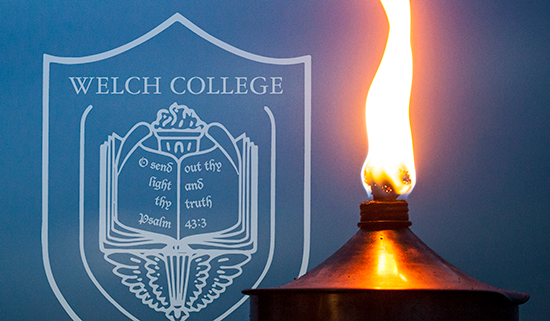
October-
November 2016
Moving Forward
------------------
|






"O Send Out Thy LIGHT and THY TRUTH"
By J. Matthew Pinson
For many decades the motto of Welch College has been taken from Psalm 43:3: “O send out thy light and thy truth.” This has been symbolized in the official college seal, about which my colleague Dr. E. Darrell Holley wrote the following:
The college seal represents the college’s belief in the total integration of a biblical Christian faith and the tradition of the Christian liberal arts. The open book is thus both the Holy Scriptures and the world of letters. Superimposed on the book is Psalm 43:3: ‘O send out thy light and thy truth.’ This verse speaks of the college’s devotion to the truth of God’s Word and the truth revealed in nature, as well as to the college’s dedication to the evangelical task of making God’s truth known to all. This belief is re-emphasized by the torch behind the open book. The torch, the symbol of this light, is winged to emphasize the college’s aim of sending the light of God’s truth throughout the world.
I want to meditate on this verse. It gets to the heart of our radical need for God’s light and truth in the midst of a dark, distorted world. Without the light and truth of the Father, Son, and Spirit, we will never be free to be who God created us to be. We never will be truly human, truly the image of God. But we know, through Christ, that His light and truth have the power to transform us and recreate us in the image of God’s dear Son, and that changes everything, both for the here and now and for eternity.
The context shows us that the psalmist is in trouble. This is good news for us, because we’re also in trouble. We’re perennially in trouble because of our sin and alienation from God. As a result of this condition, we do not operate the way our Creator designed us to. Everything in our lives is out of kilter, and things can be set right only through a relationship with our Creator and His truth, as we conform to His life and His ways.
But not only are we in trouble individually, our culture is also in trouble. The current culture here in the West is entering a post-Christian phase in which it is setting itself more and more against God and His truth. This psalm helps us see what we need to do when we face this sort of trouble.
The psalmist says, Lord, the thing I need most of all when I feel overwhelmed by trouble all around me, when You seem absent, when I am in deep distress—the thing I need most of all is Your light and Your truth. We need the truth of the Trinitarian God to make sense of this world we live in and to find a way out of our despair.

When the Bible talks about truth, it’s talking about something different from what our postmodern culture means by truth. In our current cultural mood, we have a tendency to say, “Truth is relative. You have your truth; I have mine.” But that’s not the way the Bible sees truth at all.
Here’s a quick, thumbnail definition of truth: truth is a God’s-eye-view of reality. It’s what is in God’s mind. It’s the real nature of things as God sees them. When the Bible speaks of truth, it means two things that could be summed up in two words—faithfulness and factuality. Faithfulness describes personal reliability, and factuality stands in opposition to falsehood. Most of the uses of truth in both the Old and New Testaments are derivatives of these two uses. (See Anthony C. Thiselton’s still-excellent entry for “truth” in the New International Dictionary of New Testament Theology published by Zondervan in 1978.)
Liberal-leaning scholars in the 19th century began to drive a wedge between these two uses. They said there was a conflict between the Hebrew concept of truth as personal faithfulness and the Greek concept of truth as factuality. Rudolf Bultmann, for example, said the Apostle John was guilty of soaking up Greek ideas in his idea of truth.
I think this approach is eating away at our culture and at students in so many schools and universities. It’s the view that truth is really only “personal” truth, personal faithfulness or reliability, that truth as fact is unimportant. This leads to a de-emphasis on absolute or objective truth and an emphasis on the subjective, on personal perception.
But Scripture never presents truth as relative. It’s absolute. It’s what Francis Schaeffer called “true truth” or “Truth with a capital T.” When we proclaim to the world that racism is wrong; or that human trafficking is wrong; or that lying, abortion, or same-sex relationships are wrong; we’re not just saying it’s wrong to us, to our culture, to our time. We’re saying it’s wrong in the mind of God.
Christians believe in objective truth. The Bible even goes so far as to say that everybody knows the basic truth of reality. St. Paul said in Romans 1:18-23:
For the wrath of God is revealed from heaven against all ungodliness and unrighteousness of men, who hold the truth in unrighteousness; because that which may be known of God is manifest in them; for God hath shewed it unto them. For the invisible things of Him from the creation of the world are clearly seen, being understood by the things that are made, even His eternal power and Godhead; so that they are without excuse: because that, when they knew God, they glorified Him not as God, neither were thankful; but became vain in their imaginations, and their foolish heart was darkened. Professing themselves to be wise, they became fools, and changed the glory of the uncorruptible God into an image made like to corruptible man, and to birds, and fourfooted beasts, and creeping things.
As you can see from Romans 1, we’ve got a big problem, and it creates a tension within us. On some deep level, we know the truth, but because of our sinfulness and fallen nature, we suppress it. We tuck away the truth so deeply that it’s no longer in our consciousness.
What good is truth if you can’t really know it and act on it, because you’re so sinful and so distorted in your understanding? That’s where light comes in. The Father, the Son, and the Holy Spirit give us light so we can see the truth for what it is. That’s why the psalmist says, “Send out your light and your truth.”
This is why theologians have always spoken of the Holy Spirit’s work of illumination. Not only does the Holy Spirit inspire or breathe out the words of Scripture, He also illumines our understanding so we can see the truth He has breathed out. This is also why salvation is so often referred to in Scripture as enlightenment (Hebrews 6:4).
The light is the Father, Son, and Spirit coming to us and bringing the light of their own personal word to us, and then helping us to understand that Word by the Spirit’s illumination and enlightening of our hearts and minds.
This is why Jesus is called the Light of the World. We know from Scripture that a little bit of His light goes out to everyone. In other words, God somehow tells everyone about Himself and gives everyone a glimpse into reality. That’s why John says in His gospel that Jesus is the light that lights everyone who comes into the world (1:9).
I like this, because I have two alma maters with this motto—not just Welch College but Yale University. For hundreds of years, the Yale motto has been lux et veritas (Latin for light and truth). My wife Melinda and I used to go to Yale-Harvard ballgames. Yale students would always hold up homemade signs poking fun at Harvard’s motto, which was veritas—truth. The posters would say something to the effect that veritas without lux is not enough.
I doubt those students knew just how profound their statements were. The signs they held up at those games get to the heart of our predicament as sinful human beings enmeshed in a distorted, disordered life, alienated from the life we were created to live.
Without light, we can’t really understand the truth. True, Jesus said, “You will know the truth, and the truth will set you free.” But without the light of God’s revelation, God’s Word illuminated by His Spirit, we really can’t comprehend the truth. And we’ll always remain in bondage.
At Welch College, our purpose is to create an environment in which God’s light and truth will be on display. This will change the way we look at knowledge and learning, at how we understand God’s Word and God’s world, and how the two relate. It will also change the way we look at our ultimate purpose in life, how the light of the gospel pierces our dark world and changes everything.
We know—and we want to teach and model before our students—that the light and the truth of the Lord is the only way to have liberation from the despair in which we find ourselves, which is the result of our sinfulness. According to the Psalmist, that light and that truth will produce in them and the world around them, deliverance from despair, divine guidance, nearness to God, forgiveness of sin, joy, praise, and hope.
With the psalmist, this will ever be our prayer: “O send out thy light and thy truth.”
About the Writer: J. Matthew Pinson is president of Welch College. Learn more about the college: www.Welch.edu or visit his blog: www.MatthewPinson.com.
|
|

